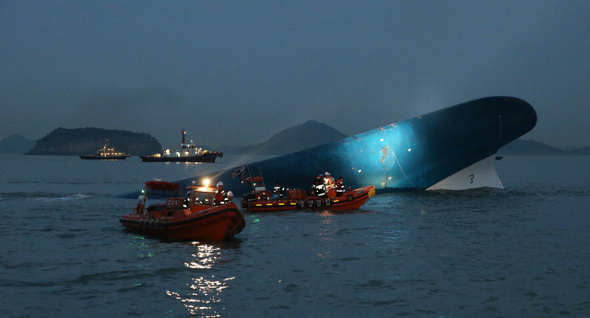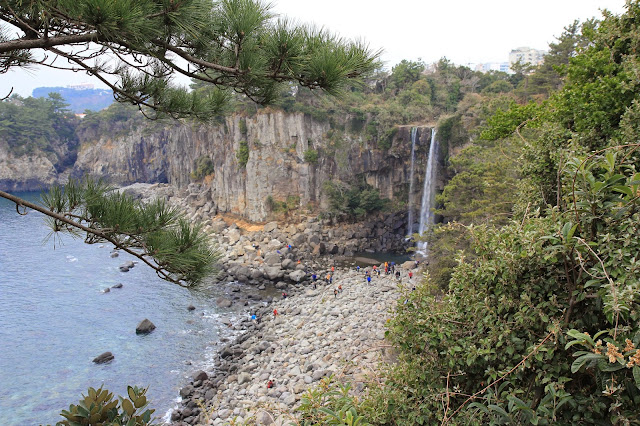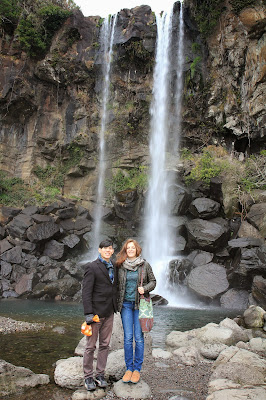About six months ago, I introduced my self-directed research project about Jeju-eo, the endangered variety of Korean spoken on Jeju Island. Since then, I've been happily busy with the linguistic documentation work which I received a small Fulbright grant to do.
In January, I met with a professor of Jeju National University to get his insight and some inside information on what language activism looks like on the autonomous island province of Korea. Then, nothing happened for a while.
The fieldwork was fun but a bit nerve-wracking, at least for the first part. Through a friend of a friend, I met an elderly couple who live in a rural area outside of Jeju City. They are known to be very involved in the local language activism community, so fortunately, they were very willing to talk about Jeju-eo with a complete stranger, and told me many stories. For example, they explained why Jeju-eo sounded so clipped (shortened words make communication across long distances easier when wind is constantly blowing over the island) and highlighted the main differences between Standard Korean and Jeju-eo.
The nerve-wracking part was that I felt way out of my depth in terms of language ability. These people spoke no English, so all of our communication was done in Korean. It was tough for me to explain exactly how I needed them to elicit the words I wanted to record. Also, there was a lot of ambient noise in the recordings, because we were meeting in their house, which meant that they offered snacks and were busy eating them the entire time. Also, the background noise of refrigerators, clocks, and a farm have probably ended up in these recordings.
In January, I met with a professor of Jeju National University to get his insight and some inside information on what language activism looks like on the autonomous island province of Korea. Then, nothing happened for a while.
The fieldwork was fun but a bit nerve-wracking, at least for the first part. Through a friend of a friend, I met an elderly couple who live in a rural area outside of Jeju City. They are known to be very involved in the local language activism community, so fortunately, they were very willing to talk about Jeju-eo with a complete stranger, and told me many stories. For example, they explained why Jeju-eo sounded so clipped (shortened words make communication across long distances easier when wind is constantly blowing over the island) and highlighted the main differences between Standard Korean and Jeju-eo.
The nerve-wracking part was that I felt way out of my depth in terms of language ability. These people spoke no English, so all of our communication was done in Korean. It was tough for me to explain exactly how I needed them to elicit the words I wanted to record. Also, there was a lot of ambient noise in the recordings, because we were meeting in their house, which meant that they offered snacks and were busy eating them the entire time. Also, the background noise of refrigerators, clocks, and a farm have probably ended up in these recordings.
 |
| The friendly and hospitable first group of consultants. They welcomed me to come back any time in the future! |
My second group of consultants were much easier to work with, since they were a mother and a daughter, and the daughter happened to be an English teacher. Again, I was connected through a friend of a friend, and again, even though I was just this random kid with a microphone, they were enthusiastic about helping and showed a great deal of generosity.
Because the linguistic barriers were no longer an issue, the second recording session went much more smoothly, and we worked for over an hour to collect over one hundred words, including many that are unique to Jeju-eo. These are the recordings that I have been putting into the Jeju-eo Online Talking Dictionary.
Ah, yes, the dictionary. The big project. I can freely admit that the lexicographical process is much more of a mountain than the molehill I expected it to be. Although I returned from Jeju Island happy and ready to dive right into the splicing, transcribing, annotating, and uploading work required to build up the dictionary from nothing, well, all of that work took a lot more time than I'd planned for. Weeks went by, and then months, and still I never got close to finishing. Then the semester got busy, and I had to put my project on hold.
Back when I did online lexicography in college, it was as part of a team. Despite my experience -- or perhaps beacuse of it? -- I underestimated my ability to do all the work on my own!
Finally, in early June, the deadline for my final report drew nearer, and I realized that it was now or never. I spent hours upon hours one weekend churning out data, giving myself just enough to work with for a few key observations in my report, and finished the eight thousand-word paper just before the deadline! This wasn't the worst I've ever procrastinated, but -- whew! -- It certainly was a wake-up call to the kind of work I might be doing in grad school. Note to self: no full-time jobs when you're doing full-time research, too. :)
Anyway, what I have to show for my work now is a modest online dictionary of Jeju-eo that you can browse at your leisure here. It's not complete by any means, and it's also imperfect. (This is mostly due to my imperfect translations and transcriptions. I do need help with the Korean, so if you know anyone who's willing to lend a hand or an ear, let me know!) But, as my friend Coby put it, "Something now exists that didn't exist before because of your work. That's awesome!"
In other news, I learned that a Fulbright Junior Researcher for the 2014-2015 grant year is going to be doing a similar project! Actually, let's be real here: her project is essentially exactly the same as mine. But she will have full funding for a year's worth of research and dictionary-making, and she will also be based on Jeju Island, so she can develop better connections and do more in-depth fieldwork. I've already been in touch with her, and I'm excited about the prospect of collaborating.










































